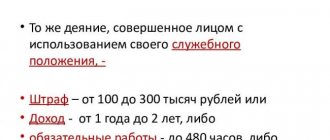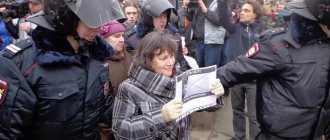1. Obstructing the legitimate professional activities of journalists by forcing them to disseminate or refuse to disseminate information -
shall be punishable by a fine in the amount of up to eighty thousand rubles, or in the amount of the wages or other income of the convicted person for a period of up to six months, or by compulsory labor for a term of up to three hundred sixty hours, or by corrective labor for a term of up to one year.
2. The same act committed by a person using his official position, -
shall be punishable by a fine in the amount of one hundred thousand to three hundred thousand rubles, or in the amount of the wages or other income of the convicted person for a period of one to two years, or by compulsory labor for a term of up to four hundred eighty hours, or by corrective labor for a term of up to two years, or by forced labor labor for a term of up to two years with deprivation of the right to hold certain positions or engage in certain activities for a term of up to three years or without it, or imprisonment for a term of up to two years with deprivation of the right to hold certain positions or engage in certain activities for a term of up to three years or without such.
3. Acts provided for in parts one or two of this article, coupled with violence against a journalist or his relatives or with damage or destruction of their property, as well as with the threat of using such violence -
shall be punishable by forced labor for a term of up to five years or imprisonment for a term of up to six years with or without deprivation of the right to hold certain positions or engage in certain activities for a term of up to three years.
- Article 143. Violation of labor protection requirements
- Article 144.1. Unreasonable refusal to hire or unjustified dismissal of a person who has reached pre-retirement age
Legislative framework of the Russian Federation
canceled/voided Edition dated 18.05.1995
detailed information
| Name of document | “CRIMINAL CODE OF THE RSFSR” (as amended on May 18, 1995) |
| Document type | code, list, criminal code |
| Receiving authority | Sun RF |
| Acceptance date | 01.01.1970 |
| Revision date | 18.05.1995 |
| Date of registration with the Ministry of Justice | 01.01.1970 |
| Status | cancelled/lost force |
| Publication |
|
| Navigator | Notes |
“CRIMINAL CODE OF THE RSFSR” (as amended on May 18, 1995)
Article 148. Extortion
Demanding the transfer of someone else's property or the right to property or the commission of any actions of a property nature under the threat of disclosing defamatory information about the person or his relatives who own, maintain or protect this property -
shall be punishable by imprisonment for a term of up to three years, or correctional labor for a term of one to two years, or a fine of up to twenty-five times the minimum wage.
Demanding the transfer of someone else's property or the right to property or the commission of any actions of a property nature under the threat of violence against a person or his relatives, in the ownership, control or protection of which this property is located, or under the threat of damage or destruction of the property of this person or his relatives
- is punishable by imprisonment for a term of up to four years with or without confiscation of property, or correctional labor for a term of up to two years with or without confiscation of property.
Actions provided for in parts one or two of this article, committed repeatedly, or by prior conspiracy by a group of persons, or under the threat of murder or infliction of grievous bodily harm, as well as combined with violence that is not dangerous to the life and health of the victim, or with damage or destruction of property , —
shall be punishable by imprisonment for a term of up to seven years with confiscation of property.
Actions provided for in parts one or two of this article, involving the taking of hostages or causing major damage or other grave consequences,
- punishable by imprisonment for a term of five to twelve years with confiscation of property.
Actions provided for in parts one or two of this article, committed by an organized group or a particularly dangerous recidivist, as well as combined with violence dangerous to the life and health of the victim,
- punishable by imprisonment for a term of six to fifteen years with confiscation of property.
(as amended by the Law of the Russian Federation of July 1, 1994 N 10-FZ - “Russian News”, N 123, 07/06/94)
Commentary to Art. 144 of the Criminal Code of the Russian Federation
Article 29 of the Constitution of the Russian Federation guarantees freedom of thought and speech, as well as freedom of mass information. The implementation of this right is largely associated with the professional activities of journalists.
The main object of the crime in question is the constitutional right to freedom of mass information, as well as the established procedure for the professional activities of a journalist. An additional object is freedom of the press and other media.
The victim of this crime may be a journalist fulfilling his professional duty.
The professional activities of journalists are understood as editing, creating, collecting or preparing messages and materials for the editorial office of a registered media outlet on the basis of an employment or other contractual relationship between the journalist and the editorial office of a registered media outlet or under its authority.
———————————
See: art. 2 of the Law of the Russian Federation “On the Mass Media” // Gazette of the SND and the Armed Forces of the Russian Federation. 1992. N 7. Art. 300.
The professional activities of journalists in the Russian Federation are carried out in accordance with the Law of the Russian Federation of December 27, 1991 N 2124-1 “On the Mass Media”.
Article 47 of this Law provides for the rights of a journalist. In particular, he has the right:
1) search, request, receive and disseminate information;
2) visit government bodies and organizations, enterprises and institutions, bodies of public associations or their press services;
3) be accepted by officials in connection with a request for information;
4) gain access to documents and materials, with the exception of their fragments containing information constituting state, commercial or other secrets specially protected by law;
5) copy, publish, disclose or otherwise reproduce documents and materials, subject to the requirements of Part 1 of Art. 42 of this Law;
6) make recordings, including using audio and video equipment, filming and photography, except for cases provided for by law;
7) visit specially protected places of natural disasters, accidents and catastrophes, riots and mass gatherings of citizens, as well as areas in which a state of emergency has been declared; attend rallies and demonstrations;
verify the accuracy of the information provided to him;
9) express your personal judgments and assessments in messages and materials intended for distribution, signed by yourself;
10) refuse to prepare, under his signature, a message or material that contradicts his beliefs;
11) remove his signature from a message or material, the content of which, in his opinion, was distorted during the editorial preparation process, or prohibit or otherwise stipulate the conditions and nature of the use of this message or material in accordance with Part 1 of Art. 42 of this Law;
12) distribute messages and materials prepared by him under his signature, under a pseudonym or without a signature.
The journalist also enjoys other rights granted to him by the legislation of the Russian Federation on the mass media.
The listed and other rights of a journalist are the implementation of the constitutional right to freely seek, receive, transmit, produce and distribute information in any legal way (Part 4 of Article 29 of the Constitution of the Russian Federation).
The objective side of the crime is expressed in the act in the form of obstruction of the legitimate professional activity of a journalist, and is also characterized by the method of obstruction - coercion to disseminate or refuse to disseminate information.
Obstruction is opposition by others by forcing journalists to disseminate information. Coercion can be carried out both by influencing a mass media body (threat of termination or suspension of its activities, destroying the circulation or part of it, and other similar acts), and by influencing the journalist himself. In particular, coercion can be expressed in the use of violence against the journalist himself or his relatives, in the threat of its use, in the destruction or threat of destruction of property, the threat of dismissal, demotion, blackmail, i.e. the threat of disclosure of undesirable information, and other actions that violate the legal rights and interests of the journalist (dissemination of information discrediting the journalist and his relatives, etc.).
Causing harm to other objects while obstructing the legitimate professional activities of journalists will require qualification for a set of crimes.
The dissemination of information means any form of bringing it to an indefinitely large circle of people, the mass consumer: publication, appearance on radio, television, etc.
The corpus delicti is formal. The crime is over from the moment the act itself is committed, regardless of whether it was possible to get the journalist to disseminate or refuse to disseminate this or that information.
The subjective side of the crime is characterized by guilt in the form of direct intent. The person is aware that he is interfering with the legitimate professional activities of a journalist, using coercion to disseminate or refuse to disseminate information, and wishes to carry out such actions.
The subject of the main crime is general. He is a sane person who has reached the age of sixteen. In a qualified composition, a special subject is an official of the media outlet where the journalist works, or any other person with an official position that is used to impede the legitimate professional activities of the journalist.
Commentary on Article 206 of the Criminal Code of the Russian Federation
1. The penalty for taking hostages was established on July 10, 1987 in connection with the growth of international terrorism and the accession of the USSR to the International Convention against the Taking of Hostages, adopted by the session of the UN General Assembly on December 17, 1979 <1>. ——————————— <1> Sat. international treaties of the USSR. Vol. XLIII. M., 1989. S. 99 - 105.
2. Hostage-taking in Russia is a fairly common phenomenon, which has spread significantly in connection with military operations in Chechnya. It is not uncommon for hostages to be taken in correctional institutions and pre-trial detention centers for the purpose of both escaping and changing the regime, obtaining various privileges, releasing individuals, etc.
3. The object of the criminal attack is public safety. An additional object is the personal freedom of a person, and optional objects are the life of a person captured as a hostage.
4. The victim (hostage) is an individual captured by the perpetrator, a citizen of the Russian Federation, a foreigner or a stateless person. A hostage can be either one person or a group of people.
5. The objective side of the crime consists of taking a hostage or holding a person as a hostage.
6. Hostage taking is the taking of a person with subsequent restriction of his freedom of movement. The seizure can be carried out secretly or openly, by deception, without violence or with violence, including the use of weapons.
7. Holding a person as a hostage is forcibly preventing the hostage from leaving a particular premises.
8. The demand presented to the guilty state, international or other organization or citizens can be of both a property (money, transport, things) and non-property nature (to be released from office, from imprisonment, to terminate criminal prosecution, etc.) in nature.
8.1. Most often, hostage-taking is accompanied by a demand to provide transport (usually an airplane), a large sum of money (usually in foreign currency), weapons and drugs, and not to prevent the criminals from flying to another country.
9. Part 1 comment. Articles should qualify the taking of a hostage or his detainment, accompanied by violence not dangerous to life and health (see commentary to Article 161), or the threat of violence. The threat can be in the form of a threat to kill (verbally or by showing a weapon), a threat to cause harm to health of varying severity. The threat is possible both at the time of capture and after it. It is addressed to the victim or his relatives, state officials (president, ministers, heads of administrations) or legal entities (administration of a correctional institution, head of an enterprise, organization or institution). The threat must be perceived as real.
10. The crime is completed (by the main body) at the moment of capture or detention of a person, if the capture was carried out by other persons. The crime itself, which continues, ceases at the moment the hostage is released from captivity by both himself and the perpetrator. The duration of the hold does not matter.
11. Subjective side - direct intent and special purpose - forcing the state, organization or citizen to perform any action (release an arrested or convicted person, transfer money and weapons, etc.) or refrain from committing any action (not initiate criminal proceedings , not to destroy a building or other structure, not to use the land in accordance with the intended program, etc.) as conditions for the release of the hostage. Motives do not affect qualifications.
12. The subject of a criminal offense is a citizen of the Russian Federation, or a foreigner, or a stateless person of sane age who has reached 14 years of age.
13. Qualifying and especially qualifying circumstances provided for in parts 2 and 3 of the commentary. Articles basically coincide with those of kidnapping (see commentary to Article 126), with the exception of the sign of hostage-taking for hire. In this case, we mean a hostage-taking carried out by a person specially hired for this purpose. The perpetrator in this situation is the person(s) who takes the hostage or holds the person as a hostage for a reward offered by the instigator or organizer. At the same time, it should be borne in mind that a qualified type of hostage taking (Part 2) constitutes only the actual use of violence dangerous to life and health, i.e. causing a hostage or other person who prevented the capture or retention of a hostage to suffer light, moderate or serious harm to health. Taking a hostage, accompanied by the threat of such violence, entails a criminal offense under Part 1 of Art. 206.
14. About the organized group (part 3), see comment. to Art. 126.
15. On causing death by negligence to a person (Part 3), see commentary. to Art. 126.
16. Grave consequences provided for in Part 3 of the commentary. Articles include major material damage as a result of the destruction of property of citizens, enterprises and institutions of any form of ownership, as well as an international or interethnic conflict generated by the taking of hostages.
17. Hostage taking differs from kidnapping and unlawful deprivation of liberty by the open and daring nature of the actions of the perpetrator and the presence of certain requirements addressed to the state, international and other organizations and citizens.
18. Kidnapping, like unlawful imprisonment, can be an act of revenge, jealousy, hatred and is not accompanied by any conditions or requirements addressed to the victim or his relatives. If the mentioned crimes were accompanied by property demands, then such demands are presented to the victim himself or his relatives in secret both from other persons and from law enforcement agencies. Hostage taking is a special norm in relation to unlawful deprivation of liberty, and therefore has priority when these norms compete.
19. Infliction of any harm (including deprivation of life) to persons capturing or holding a hostage is lawful if it is committed in a state of necessary defense. Causing harm to third parties in the process of stopping the taking or releasing a hostage should be considered based on the conditions of legality of extreme necessity and causing harm during the detention of the person who committed the crime.
20. Intentional causing of death in the process of taking or holding a hostage forms a set of crimes - hostage taking and murder (clause “c” of Part 2 of Article 105).
21. Deliberate destruction and damage to property in the process of taking a hostage entails a criminal offense under Art. 206 and 167.
22. Taking a hostage with the aim of escaping from places of deprivation of liberty forms a set of crimes provided for in Art. 206 and 313.
23. In accordance with note. to comment According to this article, a person who voluntarily or at the request of the authorities frees a hostage is released from the criminal code, unless his actions contain another crime. The perpetrator is released from the criminal offense for taking a hostage only if he, having the opportunity to hold the hostage, voluntarily and finally released him at his own request. In these cases, criminal prosecution is possible only for causing harm to the health of a hostage, damaging or destroying vehicles or other property of any form of ownership, using weapons and other crimes provided for in the relevant articles of the Criminal Code, committed in the process of capturing or holding a person as a hostage.
24. Taking hostages in accordance with Part 1 is a serious crime, Parts 2 and 3 are especially serious.


